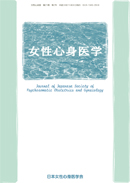
- Issue 3 Pages 157-
- Issue 2 Pages 57-
- Issue 1 Pages 1-
- |<
- <
- 1
- >
- >|
-
[in Japanese]2021Volume 25Issue 3 Pages 157-158
Published: 2021
Released on J-STAGE: April 02, 2021
JOURNAL FREE ACCESSDownload PDF (145K)
-
Yoko ONO, Takeaki TAKEUCHI, Ruriko TSUSHIMA, Yuzo NAKAMURA, Masahiro H ...2021Volume 25Issue 3 Pages 175-182
Published: 2021
Released on J-STAGE: April 02, 2021
JOURNAL FREE ACCESS【Purpose】Menopausal disorders are affected by a combination of physical, psychological and social factors. There are many unknown factors for menopausal disorders. The purpose of this study was to examine the factors related to the severity of menopausal symptoms in terms of amplification of physical/anatomical sensations. 【Subjects and Methods】One hundred ten women were chosen among those who first visited a gynecological clinic in Tokyo between January 2017 and December 2017. The age range was from 45 to 55 years old. Five questionnaires such as:1) Simplified Menopausal Index:SMI, 2) Somatosensory Amplification scale:SSAS, 3) Beck Depression Inventory-II:BDI-II, 4) State-Trait Anxiety Inventory-JYZ:STAI,5) Ego Attitude Scale:EAS were distributed to 98 women. The demographic variables and questionnaires were compared between the following two groups, the severe group and the mild group of the menopausal symptoms. Severe and mild classification was performed using SMI. 【Results】The scores of BDI-II and SSAS were significantly higher (p<0.01), and the “naturalness” and “intuition” in EAS were significantly lower in the severe group (p<0.01). Depression and somatosensory amplification were significantly associated with the severity of menopausal symptoms (p<0.05). 【Conclusion】Depression and somatosensory amplification were considered to be a factor for the aggravation of menopausal disorders.
View full abstractDownload PDF (376K)
-
Yuriko ENYA, Kiyoko KABEYAMA2021Volume 25Issue 3 Pages 183-190
Published: 2021
Released on J-STAGE: April 02, 2021
JOURNAL FREE ACCESSAims:To investigate the association between the depression status of couples and their affection toward their child from birth until 1 month postpartum.
Methods:A questionnaire survey was conducted involving 376 couples in the early postpartum period and at 1 month postpartum. The questionnaire items included:basic attributes and Edinburgh Postnatal Depression Scale (EPDS), parental attachment scale (PAS), parenting self-efficacy scale (PSE), and marital satisfaction scale scores. The relationship between the EPDS score and each item was analyzed.
Results:Responses were obtained from 307 mothers and 218 fathers in the early postpartum period, and 149 mothers and 132 fathers at 1 month postpartum. The tendency to develop negative emotions toward the child was more marked among mothers and fathers with an EPDS score of 9 or higher in the early postpartum period and at 1 month postpartum. Among mothers, the non-depression group with EPDS scores lower than 9 achieved significantly higher PSE scores at both points.
Conclusion:The results revealed that postpartum depression negatively affects attachment development, and mental stability is essential for parents to build favorable attachment relationships with their children, suggesting the necessity of promoting and improving emotional support for both mothers and fathers.
View full abstractDownload PDF (318K)
-
Masakazu TERAUCHI, Kanako INABE, Yurie NISHI, Akihiro FUJIMOTO, Maika ...2021Volume 25Issue 3 Pages 191-197
Published: 2021
Released on J-STAGE: April 02, 2021
JOURNAL FREE ACCESSDownload PDF (583K)
- |<
- <
- 1
- >
- >|